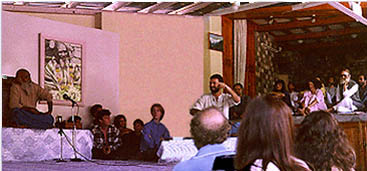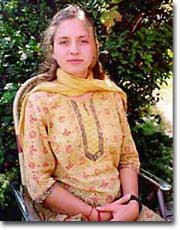Icon Show: Interviews
Unmukt
photo by Gisele |
BiographyUnmukt, came to know about meditation through friends who had been to Kullu and had studied meditation from a young age. After High School Unmukt decided to travel and meet Swamiji herself. She was delighted with what she found, and decided to come back as soon as possible. Unmukt is currently pursuing a Master's Degree in Indian Philosophy, through Oslo University, concentrating on Swamiji's teachings on Freedom. Swamiji is her advisor, and she returns to Oslo periodically to discuss her thesis with her professors. Unmukt is also translating Swamiji's Patanjaali Yog Darshan into Norwegian. Describing herself earlier as a feminist, Unmukt intuitively tapped into it's underlying pursuit, which is self empowerment. She is now discovering the kind of freedom which is beyond mind and body, which has the potential to liberate all of humanity. Written by Gisele Beaupre |
Interview
Gisele: Unmukt, how did you come to Kullu and meet Swamiji?
Unmukt: I had been going to High School in Norway, with someone who had grown up here in Kullu, and had been here meditating off and on since he was ten years old. He talked a lot about meditation and Swamiji. Eventually I decided that I would let him teach me meditation.
After High School I decided to take a year off and travel. I wanted to go to Kullu to check it how it would be to make meditation my life. So I came and stayed here for three months. I really liked Swamiji and what was happening here, and wanted to come back. Then I came back later in 1989. There were two short trips before, and I have been living here for two years.
Gisele: Do you go back every year?
Unmukt: I have been, because I am doing some studies at the University. I am doing my Masters Degree in Philosophy here. I just have to go back to talk to my professors, get grants and to see my family, who are supporting me here.
Gisele: That's great. What is your Masters thesis in Philosophy about?
Unmukt: No one has done a Masters degree in Indian Philosophy in Oslo before. They have allowed Swamiji to be my counsellor here in India. I have two counsellors in Oslo, one in Philosophy and one in Comparative Religions. I will write something about freedom, in light of Swamiji's thought and I will have to compare it to the traditional Indian philosophy and Western thought.
Freedom is such a central question, and it is the main thing that Western thought has left out. If philosophy is going to have any purpose, except for just being some intellectual talk, then it has to have a goal, and the highest goal is the liberation of mankind, as well as the whole world, including the animals, and the environment. Indian philosophy has been always focusing on freedom. Everyone can attain it.
Freedom is beyond the mind and words and thoughts and sensations and feelings. From studying Swamiji' s interpretation of Patanjaali, I realized that the main thing was his sense of surrender. How can you ever attain that state of universality if you think you are an individual trying to attain it. So that became a great realization, that it is God who takes me there. It is God that has to realize God through this vehicle, it is not this vehicle who can realize God, because this vehicle is limited and God is infinite.
Transcribed by Gisele Beaupre

